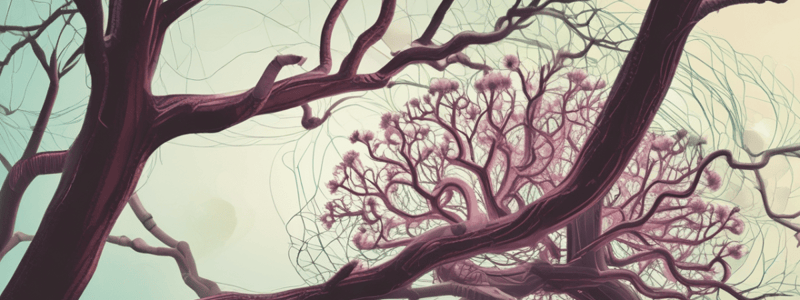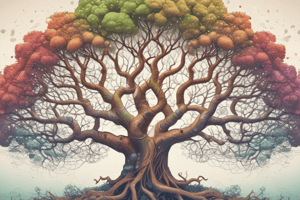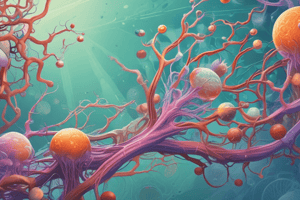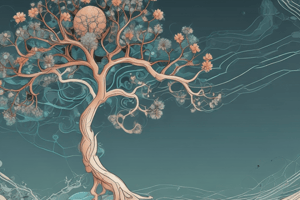Podcast
Questions and Answers
What is the study of interactions between organisms and their environment called?
What is the study of interactions between organisms and their environment called?
- Biochemistry
- Botany
- Ecology (correct)
- Microbiology
What is the main function of mitochondria in a cell?
What is the main function of mitochondria in a cell?
- Energy generation (correct)
- Protein synthesis
- Waste management
- Genetic material storage
What is the process by which cells produce gametes called?
What is the process by which cells produce gametes called?
- Mitosis
- Photosynthesis
- Respiration
- Meiosis (correct)
What is the molecule that contains genetic information in an organism?
What is the molecule that contains genetic information in an organism?
What is the process by which species change over time through natural selection?
What is the process by which species change over time through natural selection?
What is the term for the community of living and non-living components interacting in an environment?
What is the term for the community of living and non-living components interacting in an environment?
What system controls and coordinates body functions in the human body?
What system controls and coordinates body functions in the human body?
What is the term for the process by which decomposers break down organic matter?
What is the term for the process by which decomposers break down organic matter?
Flashcards are hidden until you start studying
Study Notes
Branches of Biology
- Botany: study of plants
- Zoology: study of animals
- Microbiology: study of microorganisms
- Ecology: study of interactions between organisms and their environment
- Biochemistry: study of chemical processes within living organisms
- Molecular Biology: study of biological molecules and their interactions
- Genetics: study of heredity and variation
- Evolutionary Biology: study of evolution and diversity of life
Cell Biology
- Cells: basic units of life
- Cellular components:
- Nucleus: contains genetic material
- Mitochondria: generates energy for cell
- Ribosomes: site of protein synthesis
- Lysosomes: breaks down and recycles cellular waste
- Cell membrane: regulates movement of materials in and out of cell
- Cellular processes:
- Photosynthesis: conversion of light energy into chemical energy
- Respiration: conversion of glucose into energy
- Mitosis: cell division
- Meiosis: production of gametes (sex cells)
Genetics
- DNA: double-stranded molecule containing genetic information
- Genes: segments of DNA that code for specific traits
- Chromosomes: organized structures containing genes
- Inheritance:
- Dominant and recessive traits
- Mendel's laws of inheritance:
- Law of segregation
- Law of independent assortment
- Law of dominance
Evolution
- Theory of evolution: species change over time through natural selection
- Mechanisms of evolution:
- Natural selection
- Genetic drift
- Mutation
- Gene flow
- Evidence for evolution:
- Fossil record
- Comparative anatomy
- Molecular biology
Ecosystems
- Ecosystem: community of living and non-living components interacting in an environment
- Energy flow:
- Producers: convert sunlight into energy
- Consumers: obtain energy by consuming other organisms
- Decomposers: break down organic matter
- Nutrient cycles:
- Carbon cycle
- Nitrogen cycle
- Water cycle
Human Biology
- Human body systems:
- Nervous system: controls and coordinates body functions
- Circulatory system: transports oxygen and nutrients
- Respiratory system: exchanges oxygen and carbon dioxide
- Immune system: defends against pathogens
- Human health:
- Infectious diseases
- Chronic diseases
- Nutrition and digestion
Branches of Biology
- Botany is the study of plants, including their structure, growth, evolution, classification, and interactions with the environment.
- Zoology is the study of animals, including their structure, behavior, evolution, classification, and interactions with the environment.
- Microbiology is the study of microorganisms, such as bacteria, viruses, and fungi, including their structure, function, and interactions with the environment.
- Ecology is the study of interactions between organisms and their environment, including the flow of energy and nutrients through ecosystems.
- Biochemistry is the study of chemical processes within living organisms, including the structure and function of biomolecules such as DNA, proteins, and carbohydrates.
- Molecular Biology is the study of biological molecules, including their structure, function, and interactions, and how they relate to cellular processes such as gene expression and signal transduction.
- Genetics is the study of heredity and variation, including the transmission of traits from one generation to the next and the mechanisms of gene expression.
- Evolutionary Biology is the study of evolution and diversity of life, including the processes of natural selection, speciation, and phylogeny.
Cell Biology
- Cells are the basic units of life, and are characterized by a cell membrane, cytoplasm, and genetic material.
- The cell membrane regulates the movement of materials in and out of the cell and maintains cell shape.
- The nucleus contains the genetic material and is surrounded by a double membrane called the nuclear envelope.
- Mitochondria generate energy for the cell through the process of cellular respiration.
- Ribosomes are the site of protein synthesis, where messenger RNA is translated into amino acid chains.
- Lysosomes break down and recycle cellular waste and foreign substances.
Genetics
- DNA is a double-stranded molecule containing genetic information, composed of nucleotides with sugar-phosphate backbones and nitrogenous bases.
- Genes are segments of DNA that code for specific traits, and are expressed through the process of gene expression.
- Chromosomes are organized structures containing genes, and are found in the nucleus of eukaryotic cells.
- Inheritance follows Mendel's laws of inheritance, including the law of segregation, the law of independent assortment, and the law of dominance.
- Dominant and recessive traits are determined by the genotype of an individual, and are expressed in the phenotype.
Evolution
- The theory of evolution proposes that species change over time through the process of natural selection, genetic drift, mutation, and gene flow.
- Natural selection is the process by which individuals with favorable traits are more likely to survive and reproduce, leading to adaptation to their environment.
- Genetic drift is the random change in the frequency of a gene or genetic trait in a population over time.
- Mutation is a change in the DNA sequence of an individual, which can result in genetic variation.
- Gene flow is the movement of genes from one population to another, which can lead to genetic variation and adaptation.
- The fossil record, comparative anatomy, and molecular biology provide evidence for evolution.
Ecosystems
- An ecosystem is a community of living and non-living components interacting in an environment, including producers, consumers, and decomposers.
- Energy flows through ecosystems through the process of photosynthesis, respiration, and decomposition.
- Producers, such as plants and algae, convert sunlight into energy through photosynthesis.
- Consumers, such as animals and fungi, obtain energy by consuming other organisms.
- Decomposers, such as bacteria and fungi, break down organic matter and recycle nutrients.
- Nutrient cycles, such as the carbon cycle, nitrogen cycle, and water cycle, are essential for ecosystem function.
Human Biology
- The human body consists of systems that work together to maintain homeostasis and ensure proper function.
- The nervous system controls and coordinates body functions, including the brain, spinal cord, and peripheral nerves.
- The circulatory system transports oxygen and nutrients to cells and removes waste products, including the heart, blood vessels, and blood.
- The respiratory system exchanges oxygen and carbon dioxide, including the lungs, trachea, bronchi, and diaphragm.
- The immune system defends against pathogens, including the skin, mucous membranes, and immune cells such as T cells and B cells.
- Human health is influenced by factors such as infectious diseases, chronic diseases, nutrition, and digestion.
Studying That Suits You
Use AI to generate personalized quizzes and flashcards to suit your learning preferences.




